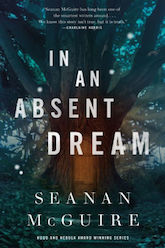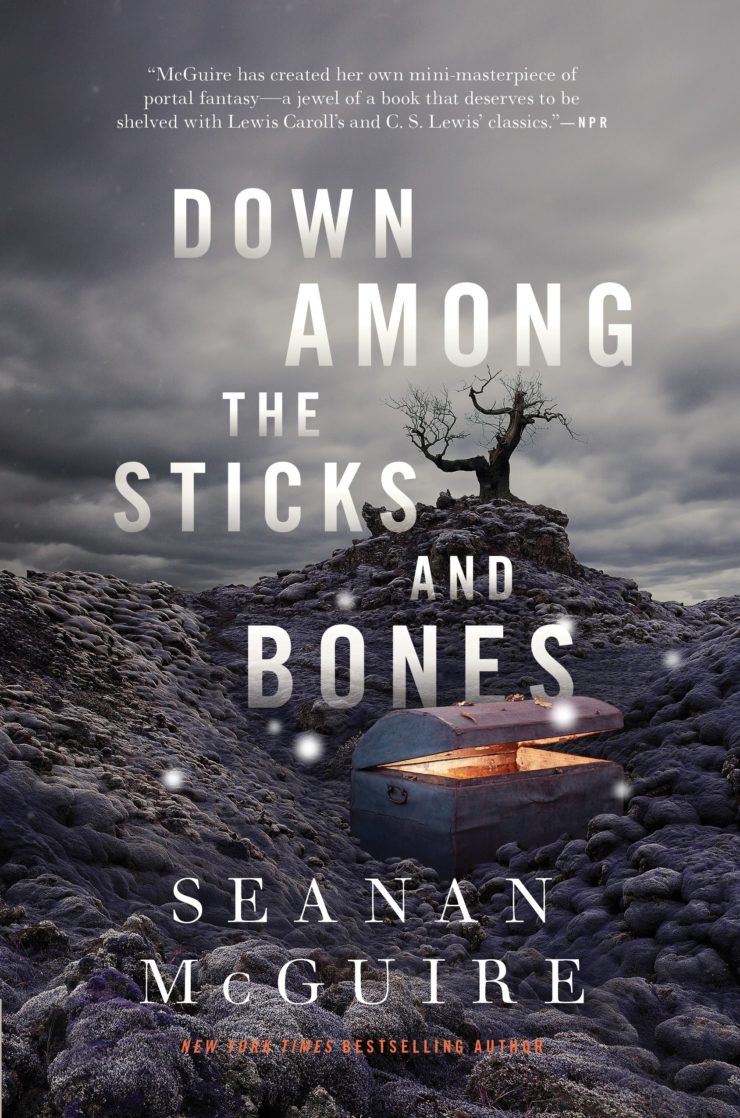Welcome back to the Wayward Children reread! Today, our Door opens onto the Moors, a Gothic land of mist and moonlight. Spoilers ahead for Down Among the Sticks and Bones.
If you want to travel to another world, you must yearn for something—something lacking in your life on Earth. Something that a world with the right rules, the right values, might provide. But not only that—there must be something you want, equally strongly, to leave behind…
Every Heart a Doorway offers hints of these things so gratefully discarded. For most of the students, it’s some variation on the universal child’s cry: “You just don’t understand me!” That misunderstanding, never trivial, is more serious for some kids than others. The disconnect is only exacerbated for the returned children and their parents, now literally from different realities.
Jack and Jill suffered particularly from that lack of understanding. In the first book, Jack explains that their parents now want nothing to do with them, because their reappearance was simply too disruptive. In Down Among the Sticks and Bones, we learn the full extent of that chasm.
Chester and Serena Wolcott aren’t kid people. But they’re impressed by their colleagues’ children, so well-behaved in their miniature suits and dresses. Who could resist such an opportunity for the approval of one’s peers? Who could resist adding such an ornament to one’s well-ordered, almost-complete life?p
Identical twins Jacqueline and Jillian, alas, come squalling into the world not as ornaments, but as real people. Their parents do their best to shoehorn them into boxes: Jill the smart tomboy, Jack the unblemished little lady. Their grandmother is reluctantly invited to help out, then summarily exiled after they go to bed on their fifth birthday—Chester and Serena, who were growing nervous of the woman’s “disorganized” influence, tell the twins only that she forgot how to love them.
They’re slowly growing apart—being forced apart—when they discover that their grandmother’s old trunk full of dress-up clothes now gapes on an endlessly spiraling stair that leads down, down, far below the earth.
Buy the Book


In An Absent Dream
In the Moors, the girls find mentors who help them rebel against the stifling roles forced on them by their parents. Jill chooses to serve the Master, the vampire who rules over the local town with an iron, bloody fist—but who likes his protégés dressed in frills and taffeta, cosseted as dolls. Jack flees the Master’s castle to apprentice with Dr. Bleak, the local mad scientist. Over the next few years Jill will learn beauty and ruthlessness—but not patience. Jack will learn strength and cleverness, how to force the lightning to her bidding—and how to love again. That last she learns from Alexis, a girl killed by a phantom lover and resurrected by Bleak’s science.
In a misguided attempt to convince the Master to vampirize her a year or two early, Jill murders Alexis. But it’s a grieving Jack who saves Jill from the resulting torch-wielding mob. Dr. Bleak forces open a Door home, and tells Jack not to bring Jill back alive. Death is reversible, of course, but the resurrected are safe from the Master’s embrace—once she’s died through other means, she’ll never be the vampire queen he desired.
All of which brings them back to their parents, who’ve started a replacement family in their absence and find their return inconsiderately messy. And thence to Eleanor West’s school, and thence to where we find them at the start of Every Heart a Doorway. Several aspects of which now make rather more sense.
Directions: Down Among the Sticks and Bones gives us a close look at the Moors, a land of Gothic horror and mad science. The Moors are logical—heavy on the rules—and wicked. It’s very definitely a to world, whose society knowingly depends on the Doors for stability.
Instructions: Strict rules and agreements govern the relationships among the Moors’ monsters, and the fate of newly arrived foundlings. One rule depends on the arrivals’ initial “choice” of who to approach, however uninformed that choice might be. Had the twins originally turned toward the sea that borders the Moors on one side, they’d have dealt with sirens and eldritch drowned lords. Had they turned towards the mountains, they’d have encountered “the lords of eternal winter.” Each lord, and each territory, has clear rules of hospitality, and of who can be harmed under what circumstances. Violate those rules at your peril.
For the setting as a whole, we also learn that the Doors can be manipulated deliberately. Bleak, delver into secrets man wasn’t meant to know, has of course delved this secret too. As Jack said last time, on the Moors the question about a scientific experiment is never “can it be done” but “should it be done,” and the answer is always YES.
Tribulations: Here there be vampires, werewolves, mad scientists, phantoms, and whatever the hell the lords of winter and the lords of the sea might be. At a deeper level, though, here there be a range of potentially treacherous parental figures, eager to shape foundlings to their own ends.
Every Heart a Doorway is a modern ensemble story, magical school subtrope. Down Among the Sticks and Bones, by contrast, is a fairy tale. Hateful parents, fateful choices, and poetically-just fates delineate its shape. And the omniscient narrator steps in regularly to reinforce how fateful those choices are. Counterfactual asides abound, from “if they had” turned toward the mountains to “if they had” reported their parents’ mental abuse to an adult who understood that children were more than archetypes. There’s even an “if they had” for the exiled grandmother: if she’d stuck around, she’d have read them fairy tales and they’d have been a lot more genre savvy. We know what would happen if they chose differently; they know only the path taken.
I appreciate the fairy tale structure, but also the characterization, deeper than such tales usually allow. No shortcut “wicked stepmother” sketches here: we spend a full quarter of the book seeing their parents’ cruelty for ourselves. It’s hard to read, not merely as a once-misunderstood child, but as a parent.
A child may accept the narrative logic of parental cruelty regardless of whether it cuts close to home, or just dramatically exaggerates their own parents’ lesser caprices. But as a parent, I look at every choice Chester and Serena make and think about how hard it is to be a good mother, but how easy it is to do better than that. And I hate them so much, reader. I want to shake them and demand how they’ve managed to so thoroughly ignore other people’s realities. This is worse than Nancy’s parents, demanding that she never change, or even Kade’s parents with their hideous transphobia—both at least focused on specific characteristics of their kids. There is literally no aspect of Jack and Jill’s inner lives that the Wolcotts care about, or even conceive of existing. There is no complexity in their understanding of other human beings—they’ve simply never considered that others might be more than what they seem on the surface. It’s vile, it’s monstrous, and worse it’s a thing that some real people seem to do. I don’t know what to do about those people, and I don’t know what to do about the Wolcotts either.
Now that I’ve got that out of my system…
Gender isn’t the only thing about which the Wolcotts are deeply screwed up, but it’s certainly an area where their screwed-upness shines. They go into childbearing with Chester wanting a boy, Serena wanting a girl, and neither bothering to mention their desires to the other. (They’re not particularly good with each others’ interior life either). Since they understand only the most performative dress-up versions of boyhood and girlhood, their obligate tomboy never gets to put on fancy dresses; their obligate femme is constantly warned about getting her frills dirty. The narrator points out frequently that they aren’t living in a 50s sitcom: other kids get to mix dresses and mud pies, short haircuts and ballerina shoes. There are many different ways of expressing your gender, most of which Chester and Serena would find unspeakably mixed-up—but don’t, because their narrow worldviews don’t even allow them to notice those options.
It’s this regimentation that makes their children so vulnerable to the Moors. The Moors are all about choice. Your choices may be ill-informed or ill-considered, but are always irrevocable. “Be sure,” says the sign on the Door. It’s a promise and a requirement: life here, unlike life with the Wolcotts, will always be shaped by your choices, and will always treat them like you were sure of them even if you didn’t feel sure. It’s also a gift: not only that your choices will have an impact, but that you’ll learn to know what you want and act on it. The Jack and Jill who tumble into the earth barely understand their own selfhoods. The pair who return know exactly who they are, what they want, and what they need to do to get it. And they’re willing to do those things.
This is the value of wicked worlds. We’re eternally attracted to villains because they’re allowed to be demanding, dramatic, and proactive. A wicked world values self-advancing action over virtuous consideration of others. Life on such a world may be fleeting, but for however long you’re around, you’ll know who you are. That may be why Jack is so willing to love and rescue her sister, in spite of the magnitude of her crime. Jack had a better mentor, but she too understands what it means to act on what you want. And a wicked world has little time for hesitation, even if the Gothic setting does suggest that the occasional overwrought monologue wouldn’t go amiss.
One of the few revocable things on the Moors is death. Lightning, harnessed to the power of Science!, can sometimes restore the price of an ill-chosen journey. Reanimation has advantages and costs, and which are which may depend on your goals. For example, you can’t become a vampire—happy for Alexis, presumably not so happy for Jill. And each subsequent attempt at reanimation becomes more risky. Meaning Bleak, sans assistant, probably won’t be able to resurrect Alexis a second time.
But then again, he might. Nothing’s entirely certain, and the Moors do encourage drama. And what could be more dramatic than for Jack to return home bearing Jill’s body—to find Alexis waiting for her. Will Alexis still want her years-lost lover? How will she feel about Bleak resurrecting her murderer? Will there be Beautiful Women Fleeing Houses?
Then of course there’s Jill’s fate. She may not be able to return to the Master, but I somehow doubt this closed path is going to improve her personality, or her ability to make good life choices. I foresee ill-fated deals with werewolves or sirens, and even more trouble for Jack.
But then, if you didn’t want trouble, you probably wouldn’t visit the Moors in the first place.
The Moors aren’t the only place where death gets a bit… flexible. And when you’re dealing with a nonsense realm, you really can’t take anything for granted. Up next: Beneath the Sugar Sky, a tale of life and death, soda pop seas, and second chances.
Spoiler policy: Comments open to spoilers for the first three books, no spoilers for In an Absent Dream until after it comes out.
Ruthanna Emrys is the author of the Innsmouth Legacy series, including Winter Tide and Deep Roots. She has several stories available on Tor.com, most recently “The Word of Flesh and Soul.” Ruthanna can frequently be found online on Twitter and Patreon, and offline in a mysterious manor house with her large, chaotic household—mostly mammalian—outside Washington DC.










